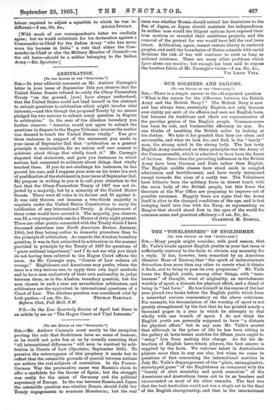ARBITRATION.
I.To THE EDITOR OF THE " SPECTATOR."] Sra,—In your editorial comment on Mr. Andrew Carnegie's letter in your issue of September 16th you observe that the United States Senate refused to ratify the Olney-Pauncefote Treaty "on the ground, [you] have always understood, that the United States could not bind herself in the abstract to submit questions to arbitration which might involve vital interests,—and this though the proposed Treaty by no means pledged the two nations to submit every question in dispute to arbitration." In the case of the Alaskan boundary you further observe ; " America would not agree to submit the questions in dispute to the Hague Tribunal, because the matter was deemed to touch the United States vitally." You give these instances in support of the statement you made in your issue of September 2nd that " arbitration as a general principle is unattainable, for no nation will ever consent to arbitrate about things that vitally touch it." Mr. Carnegie disputed that statement, and gave you instances in which nations had consented to arbitrate about things that vitally touched them. If you do not challenge his instances, he has proved his case, and I suppose your note on his letter is a sort of qualification of the statement in your issue of September 2nd. My purpose in writing to you is to call your attention to the fact that the Olney-Pauncefote Treaty of 1897 was not re- jected by a majority, but by a minority of the United States Senate. There were 42 votes in its favour and 26 against it. It was only thrown out because a two-thirds majority is requisite under the United States Constitution to carry the ratification of any international Treaty. A. displacement of three votes would have carried it. The majority, you observe, was 16, a veryrespectable one in a House of sixty-eight present. There are other points connected with the Treaty which I have discussed elsewhere (see North American Review, January, 1904), but they belong rather to domestic procedure than to the principle of arbitration. As regards the Alaskan boundary question, it was in fact submitted to arbitration in the manner -provided in principle by the Treaty of 1897 for questions of "grave national importance," and I do not see why you think its not having been referred to the Hague Court affects the issue. As Mr. Carnegie says, " Courts of Law redress all wrongs." Englishmen and Americans may prefer, where the issue is a very serious one, to apply their own legal methods and to have men exclusively of their own nationality to judge between them, as in the Alaskan boundary question, but the men chosen in such a case are nevertheless arbitrators, and arbitrators are the equivalent in international questions of a Court of Law. The Alaskan question was considered vital by P.S.—In the Law Quarterly Review of April last there is an article by me on "The Hague Court and Vital Interests."










































 Previous page
Previous page